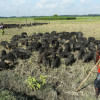Secure the future of our farmers

In spite of their immense contribution to the economy over the decades, farmers and agricultural workers in Bangladesh remain among the most neglected groups in the country. Very little has been done over the years, particularly by the government, to address their concerns and to help them overcome the challenges they face. In this context, we fully support the call to establish the Agricultural Price Commission, as proposed by agricultural experts and policymakers. Many countries have such commissions to regulate or influence agricultural prices. These bodies not only play a crucial role in ensuring fair prices for farmers, but also help maintain market stability and safeguard consumer interests, all of which Bangladesh badly needs.
Despite contributing significantly to food security and employment, Bangladesh's agriculture sector remains highly vulnerable to price shocks, unpredictable weather, and unchecked profits by middlemen. Unfortunately, there is currently no institutional mechanism in place to regulate or influence farmgate pricing, highlighting just how little attention policymakers have paid to this issue over the years.
Bangladesh ranks among the top 10 global producers of 22 agricultural products, including third in rice and vegetable production, seventh in potato, first in jute, and fifth in aquaculture. Worryingly, however, the agriculture sector has experienced a marked slowdown in growth, prompting renewed concerns about food security, rural incomes, and overall economic recovery. For instance, in FY2024-25, the sector recorded growth of only 1.79 percent, which is the lowest in over a decade. Although it remains one of the largest employment sectors, the agricultural workforce has declined sharply—from 62 percent in 2000 to 35.27 percent in 2025—posing a serious challenge to retaining farmers without ensuring reasonable profits.
Notably, between 2000 and 2016, male participation in agriculture declined while female participation increased. However, from 2016 to 2023, even female participation also fell. This may be due to agricultural work no longer providing the income required to maintain a decent standard of living, particularly when compared with other sectors. We have seen farmers leave the sector after suffering heavy losses, whether due to poor markups or the devastating effects of environmental disasters. With the impacts of climate change and other environmental hazards intensifying, farmers are increasingly vulnerable to events beyond their control. These growing risks must be mitigated, one way or another, if they are to continue farming.
Moreover, Bangladesh has one of the most severe middleman problems in the region, which results in farmers receiving the bare minimum for their labour, while middlemen and other influential actors pocket the lion's share of the profits. To reverse this situation—and to protect consumer interests—the government must introduce substantial reforms to this sector, starting with the establishment of the Agricultural Price Commission.

 For all latest news, follow The Daily Star's Google News channel.
For all latest news, follow The Daily Star's Google News channel. 









Comments